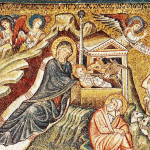We run our website the way we wished the whole internet worked: we provide high quality original content with no ads. We are funded solely by your direct support. Please consider supporting this project.

The Holy Alternative
God is holy because he’s utterly “other” and distinct from anything in the created world. Certain objects are called holy because they’re set apart from common objects, having been consecrated to God for a special purpose. And God’s people are called to be holy by virtue of the radically different kind of life we live. The church is to be first fruits, which means that we stand in contrast with fruit that has not yet ripened. As such, God’s people are God’s holy alternative to the world that at this point remains under the oppression of evil.
Another way of making this same point is to say that we’re called to be like Jesus. We are to be holy, like he is holy. The way Jesus lived was unique, to say the least, for everything about his life put on display God’s loving character. He was the quintessential “first fruit” of the coming creation and the prototype we are to passionately imitate.
This is why the New Testament emphasizes the necessity of following Jesus’ example in all that we do. “Whoever claims to live in him must live as Jesus did,” John says (1 John 2:6). Our profession of faith in Jesus lacks content except insofar as our lives look like his.
So too, Paul teaches us to “[f]ollow God’s example” (Eph 5:1). The Greek word translated “example” (mimetai) literally means to mimic. We’re to do exactly what we see God doing, which was manifest in Jesus. This is why Paul immediately goes on to flesh out what he means by commanding us to “walk in the way of love, just as Christ loved us and gave himself up for us” (Eph 5:2, emphasis added).
This is what it looks to mimic God. We’re to sacrificially love others the way Christ sacrificially loved us when he gave his life for us.
Peter makes the same point when he tells his congregation that they’re to respond to persecution not with anger and violence, but by graciously enduring it. “To this you were called,” Peter says, “ because Christ suffered for you, leaving you an example, that you should follow in his steps” (1 Pet 2:20-21).
Jesus himself drove home the necessity of following his example a number of times. For example, after washing the feet of his disciples (whom he knew would in a short while abandon him and betray him), he said, “I have set you an example that you should do as I have done for you” (Jn 13:15). The goal of Christian discipleship is to mimic our master.
Several years ago, it was common to talk about “Red Letter Christians” to refer to Christians who believe they’re supposed to obey Jesus’ teaching and live like he lived. How sad that it would occur to anyone that there’s a special class of Christians who think obeying Jesus’ teachings and living as he lived is important! Aspiring to be Christ-like is simply what the term “Christian” means.
We’ve been saved from the evil powers and freed to participate in the life of God as revealed in Christ, and when we surrender ourselves wholly to this salvation, we reflect God’s character in contrast with the world, just as Jesus did. We are God’s holy people set apart to display a radical alternative way of living in this world.
Photo credit: ignis: via VisualHunt.com / CC BY-NC-SA
Category: General
Tags: Christian Life, Holiness, Jesus
Topics: Following Jesus
Related Reading

God is Not What You Expect
Jesus came, in part, to finally reveal the absolute truth about God. He is the way and the truth (alethia) and the life (Jn 14:6). The word “truth” means “uncovered.” And what we find once God is uncovered is that he’s completely different than what we fallen humans generally expect God to be. As we…

The Cross Above All Else
The way to know what a person or people group really believes is not to ask them but to watch them. Christians frequently say, “It’s all about Jesus,” but our actions betray us. Judging by the amount of time, energy, and emotion that many put into fighting a multitude of battles, ranging from the defense…

Jesus and Democracy
Question: I’ve heard that the reason Jesus didn’t speak up on political issues was because he didn’t have the benefit of living in a democracy. Since we do, don’t we have a duty both to God and our country to be involved in politics? Answer: If the reason Jesus didn’t speak up on political issues…

What Does a Perfect God Look Like?
The “classical view of God” refers to the view of God that has dominated Christian theology since the earliest Church fathers. According to this theology, God is completely “immutable.” This means that God’s being and experience never changes in any respect. God is therefore pure actuality (actus purus), having no potentiality whatsoever, for potentiality is…

The Cross in the Manger
There has been a strand within the Western theological tradition—one that is especially prevalent in contemporary American Evangelicalism—that construes the significance of the cross in strictly soteriological terms. The cross is central, in this view, but only in the sense that the reason Jesus came to earth was to pay the price for our sin…

Join the Revolution!
We are living at a very important, and very exciting, juncture of history. The old religion of Christendom that has been identified with “Christianity” the last 1600 years is dying, and out of its ruins is arising a new tribe of kingdom revolutionaries. All around the globe people are getting the revelation that the kingdom…
